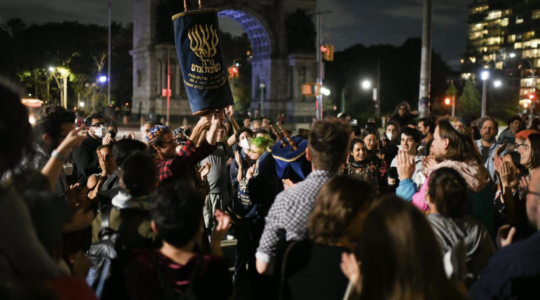The rabbis and cantors of Temple Emanu-El have for decades kept an eye on the clock on the bima near the end of Friday night worship services. Since 1940, WQXR Radio — and before that, WHN — carried a live broadcast from the sanctuary starting at 5:30 p.m. and ending exactly at 6 o’clock.
“Our services were timed to conclude with the Benediction,” the priests’ blessing that proved to be an inspiration for legions of listeners, says Rabbi David Posner, the congregation’s senior spiritual leader. “We are always conscious that we are speaking to a vastly increased congregation.”
By the end of the year, time may run out on the clock-watching.
WQXR, the New York Times-owned classical music station, was recently sold to Values To Heal America WNYC Radio, a National Public Radio station that does not carry religious broadcasts.
NPR, which receives public and private funding, “does not specifically exclude all religious programming,” says Anna Christopher, an NPR spokesman. “However,” she continued, “it does prohibit our member stations from programming their services in a manner that is intended to further a particular religious philosophy.
WQXR, which this week moved from 96.3 FM to 105.9 as part of the sale, has granted Temple Emanu-El a “grace period” to continue the public service broadcasts, the only-such weekly Jewish services on the radio, until the end of December, Rabbi Posner says. After that the congregation must find another station. “We’re looking for another home,” the rabbi says. Temple Emanu-El is looking to continue on the FM band.
However, a synagogue that has paid a nominal fee for its broadcasts is not a natural client for radio stations that can draw high listener levels and make more money through sale of commercials by broadcasting rock music or some other more traditional fare. “It is a very difficult sell,” Rabbi Posner says.
He estimates that up to a half-million people, Jews and non-Jews, listen to the weekly services; more follow the services on the congregation’s Web site (emanuelnyc.org).
“We get hundreds of letters and e-mail messages from listeners each year,” saying how grateful they are for the broadcasts, the rabbi says. Since the rabbi announced last week that the fate of the broadcasts is uncertain, “the e-mails picked up.”
“I hope you find a new home,” the listeners write, Rabbi Posner says.
If not, he says, there’s still the Internet.
If not, he adds, the rabbis and cantors at Temple Emanu-El won’t have to pay such careful attention to the clock on the bima.




